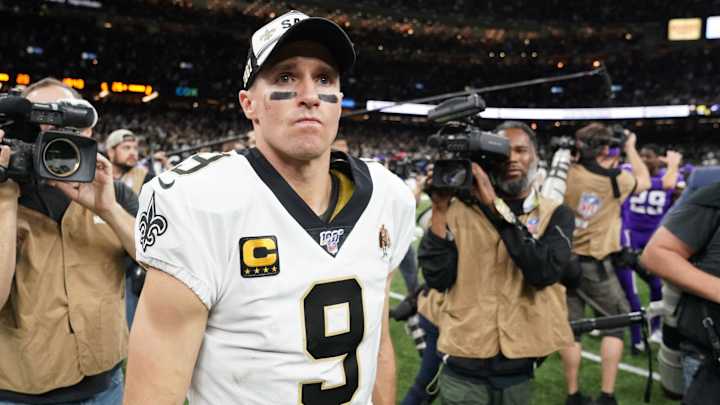Malcolm Jenkins Explains Why He Deleted Original Response to Drew Brees

After New Orleans Saints quarterback Drew Brees said, in an interview with Yahoo Finance on Wednesday, that he would "never agree with anybody disrespecting the flag of the United States of America or our country," the sports world was quick to respond, particularly Brees's fellow NFL players.
Among those to weigh in was Brees's teammate Malcolm Jenkins, who posted a video on Instagram explaining why Brees's comments were so hurtful. Jenkins originally posted a different video, in which he ended by saying, “And it’s unfortunate because I considered you a friend, I looked up to you, you’re someone I had a great deal of respect for. But sometimes you should just shut the f--- up.” He later deleted the post, but not before it was passed around on social media.
Jenkins stood by his words in a subsequent video but explained that he felt his language would be attention-grabbing, and that his message might ultimately get overshadowed.
I recorded a few videos when thinking of how to respond to Drew Brees, I don’t take any of it back-I meant what I said-I removed the 1st video because I knew it be more about the headlines. I want people to understand how those of us struggling with what’s going on feel pic.twitter.com/T054qt0YEz
— Malcolm Jenkins (@MalcolmJenkins) June 3, 2020
In his second post, Jenkins voiced his frustration at Brees's remarks: "Here we are, in 2020, with the whole country on fire, everybody witnessing a black man dying—being murdered—at the hands of the police, just in cold blood, for everybody to see...and the first thing that you do is criticize one's peaceful protest? That was years ago, when we were trying to signal a sign for help, and signal for our allies and our white brothers and sisters, the people we consider to be friends, to get involved. It was ignored."
Later in the day, Jenkins appeared on CNN, where he framed Brees's comments in another way: “There’s a joke we talked about, white people who are usually allies and who can fit in with black people, we say that they’re invited to the cookout. This is the cookout, and we need everybody—no matter who you are, what race or background—to step up and change," per David Helman of DallasCowboys.com.
Former 49ers quarterback Colin Kaepernick notably knelt during the national anthem as a means of protesting racism and police brutality during the 2016 NFL season. He later filed a grievance against the NFL, arguing that he was effectively blackballed from the league because of his views. The league denied the charge and the grievance was eventually settled.

Nick Selbe is a programming editor at Sports Illustrated who frequently writes about baseball and college sports. Before joining SI in March 2020 as a breaking/trending news writer, he worked for MLB Advanced Media, Yahoo Sports and Bleacher Report. Selbe received a bachelor's in communication from the University of Southern California.
Follow NickSelbe